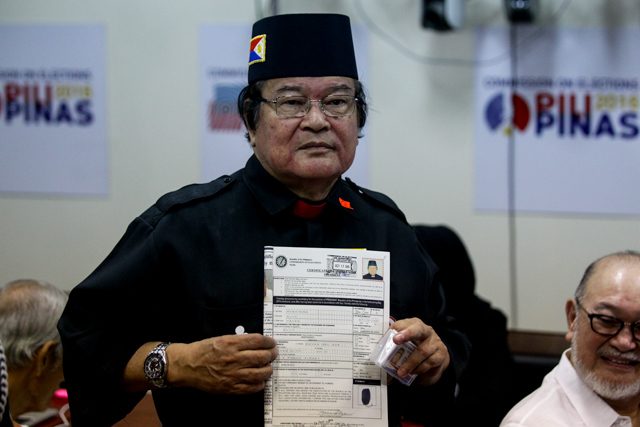SUMMARY
This is AI generated summarization, which may have errors. For context, always refer to the full article.

MANILA, Philippines – The Commission on Elections (Comelec) on Tuesday, October 13, defended its decision to accept the certificates of candidacy (COCs) of so-called nuisance bets for the 2016 elections.
“Mas maganda, mas mainam, at mas regular ‘yung bibigyan mo muna ng pagkakataon ‘yung taong marinig ang kanyang kaso bago mo siya husgahan,” Comelec Spokesman James Jimenez said in a news conference.
(It is better, more appropriate, and more regular to give a person the opportunity to let his case be heard before we judge him.)
“Makikita mo ba ‘yung buong talambuhay ng tao sa isang kapirasong papel? Makikita mo ba ‘yung buong kakayanan niya base sa nakalaman sa isang kapirasong papel. Siyempre hindi,” Jimenez added.
(Can you see the whole life of a person on a piece of paper? Will you see his capabilities based on the contents of a piece of paper? Of course not.)
He said rejecting a person’s COC, just because he or she looks like a nuisance bet at the outset, is “contrary to the idea of a democracy.”
Earlier, Comelec Chairman Andres Bautista explained that the poll body will soon make a “preliminary determination” on whether a candidate is a nuisance bet.
“We have to have a hearing to give that person the opportunity to disprove the preliminary finding of being a nuisance candidate,” he said.
Former Comelec chairman Sixto Brillantes Jr, an election lawyer, also pointed out in 2012 that filing a COC “is a matter of right.”
The Comelec is accepting COCs for the 2016 elections from Monday, October 12, to Friday, October 16.
The poll body said that as of noon on Tuesday, 32 persons have filed COCs for president, 6 for vice president, and 20 for senator. Even without a Comelec ruling, election watchers have considered many of them as nuisance bets. (READ: ‘Annoyance, frustration’ as 22 presidential aspirants file COCs)
Definition of ‘nuisance bet’
The Omnibus Election Code defines a nuisance candidate as someone who files a COC “to put the election process in mockery or disrepute or to cause confusion among the voters by the similarity of the names of the registered candidates or by other circumstances or acts which clearly demonstrate that the candidate has no bona fide intention to run for the office for which the certificate of candidacy has been filed, and thus prevent a faithful determination of the true will of the electorate.”
The Comelec disqualifies these nuisance bets even as the Constitution mandates “equal access to opportunities for public service.” This is because, according to the Supreme Court (SC), running for public office is a privilege, not a right.
SC Resolution No. 161872, dated April 13, 2004, said this in addressing the complaint of lawyer Elly Pamatong, then declared a nuisance bet in the 2004 elections. Pamatong wanted the Comelec to reverse its decision because it allegedly violates his right to “equal access to opportunities for public service,” as enshrined in the Constitution.
“Implicit in the petitioner’s invocation of the constitutional provision ensuring ‘equal access to opportunities for public office’ is the claim that there is a constitutional right to run for or hold public office and, particularly in his case, to seek the presidency. There is none,” the SC said.
“What is recognized is merely a privilege subject to limitations imposed by law,” it added, explaining that this was the intent of the Constitution’s original framers. The SC said the constitutional mandate was a general guideline, not a “judicially enforceable constitutional right.”
‘Palpably ridiculous’ candidacies
To ensure that the equal access clause is not violated, the key is to apply the limitations “to everybody equally without discrimination,” said the SC. “Equality is not sacrificed as long as the burdens engendered by the limitations are meant to be borne by anyone who is minded to file a certificate of candidacy,” the High Court said.
In setting limitations, the SC said the state should also take into account “practical considerations.” These include the following:
- Logistical “confusion” that could ensue with a greater number of candidates
- Increased allocation of time and resources to prepare for the elections
- Preparation of ballots
- Other entitlements for candidates, as provided by law, such as watchers in every polling place and in the board of canvassers, as well as the receipt of electoral contributions
“The State has a compelling interest to ensure that its electoral exercises are rational, objective, and orderly,” the SC said.
“To add into the mix candidates with no serious intentions or capabilities to run a viable campaign would actually impair the electoral process. This is not to mention the candidacies which are palpably ridiculous so as to constitute a one-note joke. The poll body would be bogged by irrelevant minutiae covering every step of the electoral process, most probably posed at the instance of these nuisance candidates,” the Court explained.
The SC said, “It would be a senseless sacrifice on the part of the State.” – Rappler.com
Add a comment
How does this make you feel?
There are no comments yet. Add your comment to start the conversation.